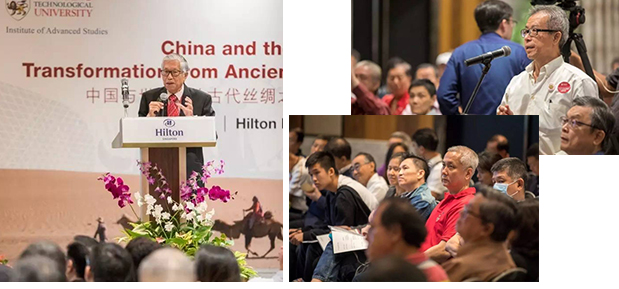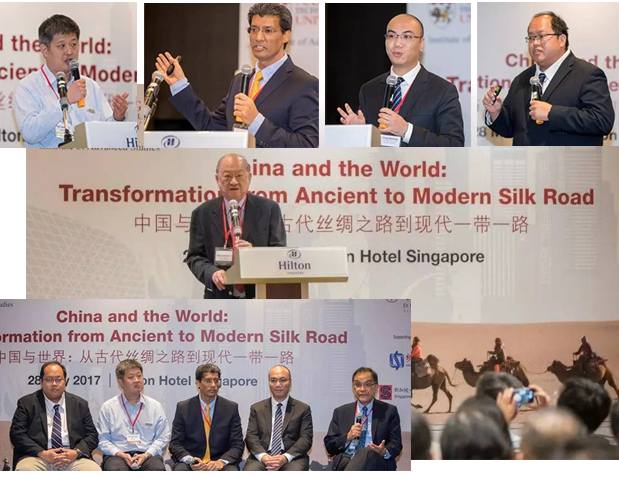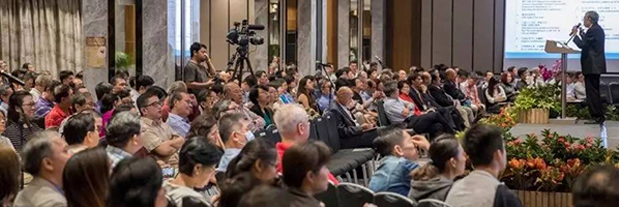On Sunday, 28th May 2017, the Workshop themed China and the World: Transformation from Ancient to Modern Silk Road was successfully at Hilton Hotel Singapore. The Workshop was jointly organized by SCFA, Institute of Advanced Studies of Nanyang Technological University, Ee Hoe Hean Club and Singapore China Business Association. It started at 9.30am and ended at 4.30pm, attracting more than 400 audiences. Speakers invited were Prof B R Deepak (Professor, Center of Chinese and SouthEast Asian Studies, Jawarharlal Nehru University), Prof Feng Da-Hsuan (Director of Global Affairs and Special Advisor to Rector, University of Macau), Prof Liang Haiming (Chairman and Chief Economist, China Silk Road iValley Research Institute), Dr Lim Tai Wei (Senior Lecturer, Singapore University of Social Sciences & Adjunct Research Fellow, East Asian Institute, National University of Singapore), Dr Tan Ta Sen (President, International Zheng He Society) and Mr Toh Han Shih (Senior Asia Correspondent, MLex). SCFA President, Prof Phua Kok Khoo was the Chairman of the Workshop.
Prof Deepak analyzed opportunities and challenges India facing in the "OBOR" initiative. He said, India's concerns are mainly the security dilemma over land and maritime security. But he believed that, the cooperation with China in the multilateral mechanism should be started. The development trend of Sino-Indian relations will formulate a new world economic and political order.
Dr Tan talked on the influences of the "OBOR" initiative towards the world, specially focused on the Maritime Silk Road. He also compared the roles of China and the United States between the 20th and 21st centuries. Although China is catching up with US in all aspects, the peace and prosperity in the 21st century are very much relying on the cooperation between China and US, for the pursuits of development, mutual benefits and win-win situation.
Dr Lim focused on the background, challenges of the "OBOR" initiative, and analyzed the Western perspectives and interpretations of international media towards the "OBOR" initiative. He also explained the Asian Infrastructure Investment Bank (AIIB), followed by the internal problems and external challenges facing the "OBOR" initiative.
Prof Liang explained the "OBOR" initiative from theoretical perspectives, and introduced the "Omnipresence Economics" theory, that is, China's initiative to build the B&R expands on a collective consensus among countries along the route for mutual cooperation. The model of "omnipresence economics" allows China to contribute its wisdom and experience towards global economic development and societal progress, and work towards a community of shared future for all humankind.
Mr Toh focused mainly on China's overseas investments, as well as challenges and influences of the "OBOR" initiative. He believed that, among the many projects under the "OBOR" initiative, there will be normal to have examples of failure projects, but in the long run, the "OBOR" initiative has a promising future.
Prof Feng emphasized the importance of "cultural communication". He believed that the communication and exchanges between people is the key towards the success of the "OBOR" initiative, in implementing the development strategies and projects. He added, global trends such as popularization of higher education, era of "global interconnectivity" and the formation of Eurasian Super-Continent, creating a new world structure. China must understand the cultures of other countries, especially its neighbour - India, towards "cultural communication", and hence to archive success in promoting the "OBOR" initiative.
The Panel Discussion and Q&A session were chaired by Prof Feng. On Singapore's role in the "OBOR" initiative, the Workshop suggested that, Singapore can act as research center or think tank of the "OBOR" initiative, studying the initiative, providing advices, to build up a successful model, develop regulations, or even lead the development direction. It is for Singapore itself, but also to contribute to all mankind.


